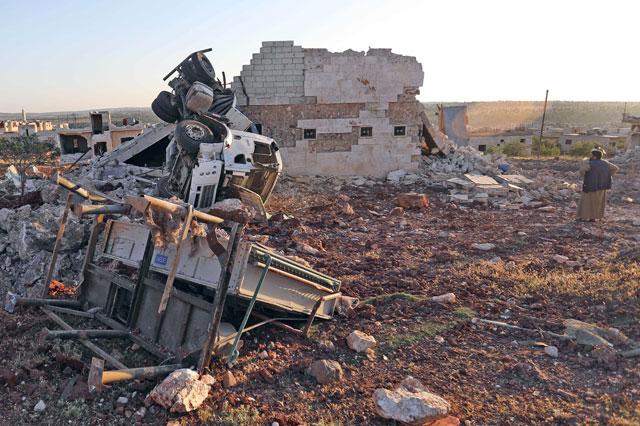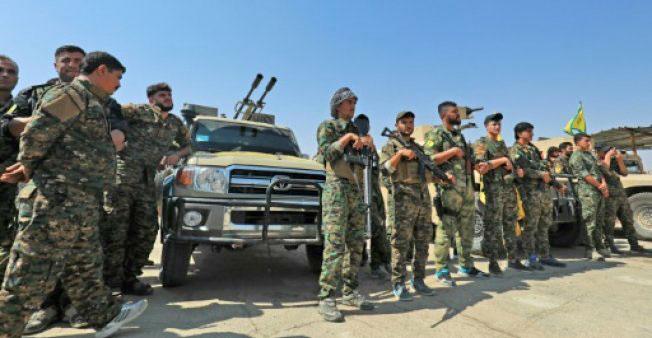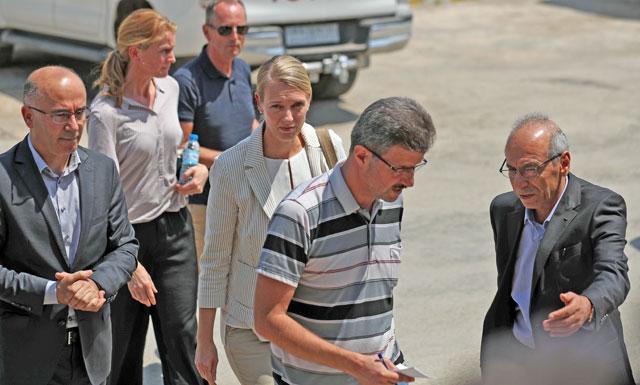You are here
Alleged Italian Daesh member handed to Rome — Syria Kurds
By AFP - Jun 29,2019 - Last updated at Jun 29,2019

In this file photo taken on May 20, a man gazes at rubble and damaged vehicles in the town of Kafranbel in the rebel-held part of the Syrian Idlib province (AFP photo)
BEIRUT — Kurdish authorities in north-eastern Syria have handed to Italy one of its citizens accused of belonging to the Daesh group, a spokesman said Saturday.
“Italian terrorist Samir Bougana [aka Abu Abdullah] who had been captured fleeing ISIS [Daesh] and had been imprisoned since then, was handed over to Italian government,” said Mustefa Bali, a spokesman for the Kurdish-led Syrian Democratic Forces, using a different acronym for Daesh.
He said the transfer had been made on Rome’s request.
He did not specify when it took place or whether or not the suspected terrorists had already left the country.
Bougana — also known as Abu Hureyre Al Muhajir or Abu Abdullah Al Muhajir — was first captured by Kurdish fighters in Syria in August 2018 as he tried to flee into Turkey.
He had allegedly been involved in weapons shipments to Daesh.
His transfer is part of a wider effort by the Kurdish administration to rid itself of the dregs of the Daesh proto-state.
Following the collapse of the group’s “caliphate” in March, alleged Daesh fighters from nearly 50 countries have been detained in Syria and Iraq.
Over 11,000 of their family members are being held in Syria’s Al Hol camp alone.
But repatriation is a sensitive issue for Western nations such as France and Britain, which have experienced attacks by homegrown extremists and have little interest in seeing more return.
There are also worries that it could prove difficult to successfully prosecute fighters in European courts for crimes committed in Iraq or Syria.
Britain has gone so far as stripping Daesh members of citizenship, while France has said it will repatriate only orphans.
The United States, however, has urged Western countries to take their nationals back and has repatriated some of its own, including three Daesh group fighters and several American women and children.
On Thursday, it warned European countries they were making a “bad decision” by leaving their nationals in Syria instead of repatriating them to face justice.
Also last week, the United Nations’ rights chief called for countries to repatriate Syria-based family members of suspected foreign fighters, including some 29,000 foreign children of Daesh fighters.
Related Articles
BEIRUT — Kurdish fighters in northern Syria detained an alleged Italian member of the Daesh group as he was trying to flee across the border
SIMALKA CROSSING, Syria — The Kurdish authorities in northeast Syria on Monday handed over four children linked with the Daesh group to Germ
VIENNA — Austria is preparing to repatriate from Syria two young orphans of a female Daesh group supporter in the first such move for Vienna













